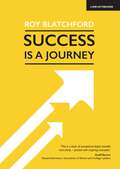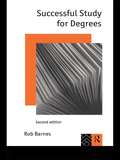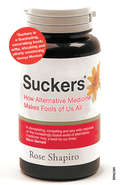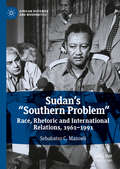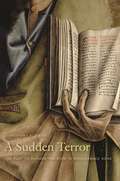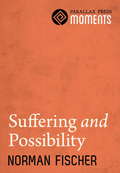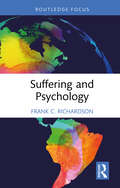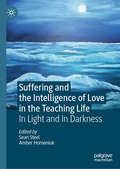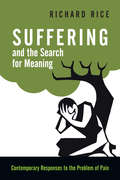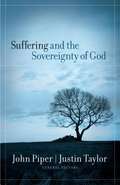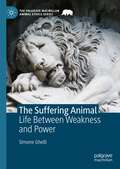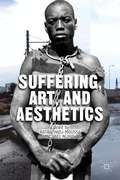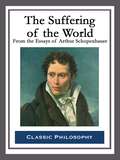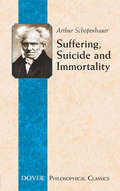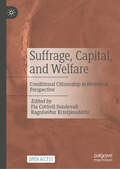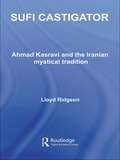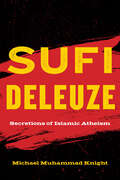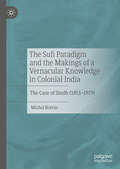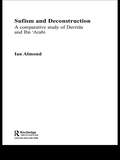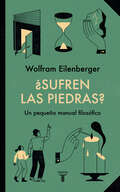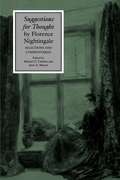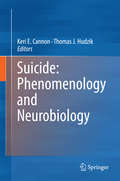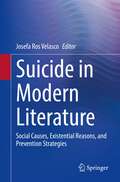- Table View
- List View
Success in Professional Experience
by Dyson, Michael and Plunkett, Margaret and McCluskey, Kerryn Michael Dyson Margaret Plunkett Kerryn MccluskeySuccess in Professional Experience has been specifically designed to assist pre-service teachers on their journey to become successful learners and teachers during the practicum component of their degree. The authors present ideas on how to develop fundamental knowledge, skills and competencies, which help to build meaningful and sustainable relationships within educational communities. Each chapter explores a different area of professional experience, including observations, expectations, mentoring, reflective practice and portfolios. There are specific chapters on areas that students often find the most challenging such as: classroom management, ethics and working with diverse student populations, as well as a chapter catering for pre-service teachers coming from a non-English speaking background. Success in Professional Experience is suitable for early childhood, primary and secondary contexts and addresses the learning needs of on-campus and distance education students. It is also a useful guide for the university liaison staff and school based mentors of pre-service teachers.
Success is a Journey
by Roy BlatchfordRoy Blatchford is one of the UK's most respected educationists. 'Success is a Journey' is a beautifully written collection of his recent essays about the education landscape, reflecting Roy's very high regard for teaching and schools. Over the past thirty years, Roy has written widely on school and college inspection, curriculum innovation, global education, policy and politics. His love of classrooms and enjoyment in watching children succeed are always present. His conversations with students, teachers and leaders have informed the content of many of the essays in this collection. Roy Blatchford's influence in establishing national standards in England's schools is evident in the contents of Part Two of the book. He was lead author of the the DfE Teachers' Standards, Master Teacher Standard and National Standards of Excellence for Headteachers. Part Three explains and exemplifies the practice of Blinks, a distinctive approach to reviewing and reporting on education settings which he has, with colleagues, established over the past fifteen years in the UK and internationally.
Success is a Journey
by Roy BlatchfordRoy Blatchford is one of the UK's most respected educationists. 'Success is a Journey' is a beautifully written collection of his recent essays about the education landscape, reflecting Roy's very high regard for teaching and schools. Over the past thirty years, Roy has written widely on school and college inspection, curriculum innovation, global education, policy and politics. His love of classrooms and enjoyment in watching children succeed are always present. His conversations with students, teachers and leaders have informed the content of many of the essays in this collection. Roy Blatchford's influence in establishing national standards in England's schools is evident in the contents of Part Two of the book. He was lead author of the the DfE Teachers' Standards, Master Teacher Standard and National Standards of Excellence for Headteachers. Part Three explains and exemplifies the practice of Blinks, a distinctive approach to reviewing and reporting on education settings which he has, with colleagues, established over the past fifteen years in the UK and internationally.
Successful Study for Degrees
by Rob BarnesSuccessful Study for Degrees is a practical guide to studying more effectively at first and higher degree levels. Aimed particularly at students looking for more than just a basic study skills book, it blends practical ideas with sound principles, and is structured so that topics such as basic essay writing feed into chapters on dissertation preparation and writing. It uses many examples drawn from interviews conducted with students and lecturers from a range of disciplines. At a time when many arts-based courses are changing in structure, particular attention is given to research-based study, which in many cases is replacing the traditional formal examination. At undergraduate level, the book gives practical guidance on reading, seminars and questioning techniques; at higher degree level, it discusses issues such as validity, reliability and meaning. The book also offers techniques of questioning to promote higher level thinking, including explorations of ways in which argument is constructed and explanations of commonly-used terms such as proposition, premise, assertion and evidence.
Suckers: How Alternative Medicine Makes Fools of Us All
by Rose Shapiro'Alternative' medicine is now used by one in three of us. In the UK we spend an estimated £4.5 billion a year on it and its practitioners are now insinuating themselves into the mainstream. There are methods based on ancient or far-eastern medicine, as well as ones invented in the nineteenth and twentieth centuries. Many are promoted as natural treatments. What they have in common is that there is no hard evidence that any of them work. Treatments like homeopathy, acupuncture and chiropractic are widely available and considered reputable by many. Ever more bizarre therapies, from naturopathy to nutraceuticals, ear candling to ergogenics, are increasingly favoured. Endorsed by celebrities and embraced by the middle classes, alternative medicine's appeal is based on the spurious rediscovery of ancient wisdom and the supposedly benign quality of nature. Surrounded by an aura of unquestioning respect and promoted through uncritical airtime and column inches, alternative medicine has become a lifestyle choice. Its global market is predicted to be worth $5 trillion by 2050.Suckers reveals how alternative medicine can jeopardise the health of those it claims to treat, leaches resources from treatments of proven efficacy and is largely unaccountable and unregulated. In short, it is an industry that preys on human vulnerability and makes fools of us all. Suckers is a calling to account of a social and intellectual fraud; a bracing, funny and popular take on a global delusion.
Sudan’s “Southern Problem”: Race, Rhetoric and International Relations, 1961-1991 (African Histories and Modernities)
by Sebabatso C. ManoeliThe book offers a history of the discourses and diplomacies of Sudan’s civil wars. It explores the battle for legitimacy between the Sudanese state and Southern rebels. In particular, it examines how racial thought and rhetoric were used in international debates about the political destiny of the South. By placing the state and rebels within the same frame, the book uncovers the competition for Sudan’s reputation. It reveals the discursive techniques both sides employed to elicit support from diverse audiences, amidst the intellectual ferment of Pan-Africanism, the Cold War, and Black liberation politics. It maintains that the interplay of silences and articulations in both the rebels' and the state’s texts concealed and complicated aspects of the country’s political conflict. In sum, the book demonstrates that the war of words waged abroad represents a strategic, but often overlooked, aspect of the Sudanese civil wars.
A Sudden Terror: The Plot to Murder the Pope in Renaissance Rome
by Anthony F. D'EliaIn 1468, on the final night of Carnival in Rome, Pope Paul II sat enthroned above the boisterous crowd, when a scuffle caught his eye. His guards had intercepted a mysterious stranger trying urgently to convey a warning conspirators were lying in wait to slay the pontiff. Twenty humanist intellectuals were quickly arrested, tortured on the rack, and imprisoned in separate cells in the damp dungeon of Castel Sant Angelo. Anthony D Elia offers a compelling, surprising story that reveals a Renaissance world that witnessed the rebirth of interest in the classics, a thriving homoerotic culture, the clash of Christian and pagan values, the contest between republicanism and a papal monarchy, and tensions separating Christian Europeans and Muslim Turks. Using newly discovered sources, he shows why the pope targeted the humanists, who were seen as dangerously pagan in their Epicurean morals and their Platonic beliefs about the soul and insurrectionist in their support of a more democratic Church. Their fascination with Sultan Mehmed II connected them to the Ottoman Turks, enemies of Christendom, and the love of the classical world tied them to recent rebellious attempts to replace papal rule with a republic harking back to the glorious days of Roman antiquity. From the cosmetic-wearing, parrot-loving pontiff to the Turkish sultan, savage in war but obsessed with Italian culture, D Elia brings to life a Renaissance world full of pageantry, mayhem, and conspiracy and offers a fresh interpretation of humanism as a dynamic communal movement.
Suffering and Possibility
by Norman FischerSuffering and Possibility is part of the Parallax Press Moments series of short ebooks. It is a stand alone chapter from Solid Ground: Buddhist Wisdom for Difficult Times.
Suffering and Psychology
by Frank C. RichardsonSuffering and Psychology challenges modern psychology's concentration almost exclusively on eradicating pain, suffering, and their causes. Modern psychology and psychotherapy are motivated in part by a humane and compassionate desire to relieve many kinds of human suffering. However, they have concentrated almost exclusively on eradicating pain, suffering, and their causes. In doing so psychology perpetuates modern ideologies of individual human freedom and expanding instrumental control that foster worthy ideals but are distinctly limited and by themselves quite self-defeating and damaging in the long run. This book explores theoretical commitments and cultural ideals that deter the field of psychology from facing and dealing credibly with inescapable human limitations and frailties, and with unavoidable suffering, pain, loss, heartbreak, and despair. Drawing on both secular and spiritual points of view, this book seeks to recover ideals of character and compassion and to illuminate the possibility of what Jonathan Sacks terms "transforming suffering" rather than seeking mainly to eliminate, anesthetize, or defy these dark and difficult aspects of the human condition. Suffering and Psychology will be of interest to academic and professional psychologists and philosophers.
Suffering and the Intelligence of Love in the Teaching Life: In Light and In Darkness
by Sean Steel Amber HomeniukThis book shares insights drawn from the diverse voices of public school teachers, community outreach education workers, professors, writers, poets, artists, and musicians on suffering in school and the classroom. Teachers speak about their own encounters with and perceptions from suffering using critical-analytic textual works, as well as first-hand personally reflective accounts. By sharing their stories and reflections, the editors and contributors shed light upon the dark areas that often are not addressed in Teacher Training Programs, and that generally remain unaddressed and unacknowledged even as teachers become well-established as professionals in the field of education.
Suffering and the Search for Meaning: Contemporary Responses to the Problem of Pain
by Richard Riceme
Suffering and the Sovereignty of God
by John Piper Justin TaylorIn the last few years, 9/11, a tsunami, Hurricane Katrina, and many other tragedies have shown us that the vision of God in today's churches in relation to evil and suffering is often frivolous. Against the overwhelming weight and seriousness of the Bible, many Christians are choosing to become more shallow, more entertainment-oriented, and therefore irrelevant in the face of massive suffering. In Suffering and the Sovereignty of God, contributors John Piper, Joni Eareckson Tada, Steve Saint, Carl Ellis, David Powlison, Dustin Shramek, and Mark Talbot explore the many categories of God's sovereignty as evidenced in his Word. They urge readers to look to Christ, even in suffering, to find the greatest confidence, deepest comfort, and sweetest fellowship they have ever known.
The Suffering Animal: Life Between Weakness and Power (The Palgrave Macmillan Animal Ethics Series)
by Simone GhelliThis book provides a critical and innovative reassessment of contemporary debate on the human-animal relationship. Starting with a critique of the “official philosophical narration” of animal studies, and then a reassessment of Descartes' animal-machine paradigm, Simone Ghelli tracks down the conceptual coordinates of what he calls “the paradigm of the suffering animal.” The suffering animal is a materialist thesis on the condition of the living, which, while contesting the metaphysical and anthropocentric structure of western axiology, eventually redefines and re-establishes ethics on the experience of suffering, that is on the mutual compassion sentient beings feel before the unjust sight of their finitude. The suffering animal paradigm shows how, within our philosophical tradition, the animal question has been always intertwined with the questions of atheism and of materialism. The ultimate aim of this research is to define the “ethical equilibrium” between aspects of the living, such as weakness and power, joy and suffering, life and death, which our philosophical tradition largely tends to consider as mutually excluding. To overcome such oppositions means avoiding opposing, in our ethical and political discourse, the defense of the vulnerability of the weak and the freedom of the powerful.
Suffering, Art, and Aesthetics
by Ratiba Hadj-Moussa Michael NijhawanHow do we conceptualize the relationship between suffering, art, and aesthetics from within the broader framework of social, cultural, and political thought today? This book brings together a range of intellectuals from the social sciences and humanities to speak to theoretical debates around the questions of suffering in art and suffering and art.
The Suffering of the World
by Arthur SchopenhauerArthur Schopenhauer was one of the world's most influential philosophers. Included here are nine of his most important essays, including 'On the Sufferings of the World,' 'The Vanity of Existence,' 'On Suicide,' 'Immortality: a Dialogue,' 'Psychological Observations,' 'On Education,' 'Of Women,' 'On Noise,' and
Suffering, Suicide and Immortality: Eight Essays from The Parerga
by Arthur Schopenhauer T. Bailey SaundersOne of the greatest philosophers of the nineteenth century, Arthur Schopenhauer is best known for his writings on pessimism. In this 1851 essay collection, he offers concise statements of the unifying principles of his thinking. Schopenhauer, unlike most philosophers, expressed himself in simple, direct terms. These essays offer an accessible approach to his main thesis, as stated in The World as Will and Representation.Schopenhauer's reasoning encompasses the influence of the Upanishads and Buddhist teachings, as well as the works of Plato and Kant. His philosophy had an enormous impact on contemporary philosophy and literature, and on subsequent thinkers such as Nietzsche, Freud, and Wittgenstein. Published toward the end of his life in a collection called Parerga und Paralipomena, these essays include "On the Sufferings of the World," "On the Vanity of Existence," "On Suicide," "Immortality: A Dialogue," "Further Psychological Observations," "On Education," "On Women," and "On Noise," plus "A Few Parables." They remain among Schopenhauer's most popular works, offering insights into his philosophy as a whole as well as the human condition.
Suffrage, Capital, and Welfare: Conditional Citizenship in Historical Perspective
by Fia Cottrell-Sundevall Ragnheiður KristjánsdóttirThis open access book examines disenfranchisement and voting barriers in ten self-governing and aspiring liberal democracies worldwide, before and after the introduction of so-called universal suffrage. Focusing on economic voting restrictions implemented through constitutional provisions and laws, it explores the various disqualifications that prevent people from voting. The notions of economic independence underpinning these restrictions have built and reinforced societal structures and power relations, particularly concerning class, gender, race, civil status, age, and education. Historically, voting rights have been celebrated as a symbol of inclusivity and equal citizenship. Yet, as contributors in this collection highlight, recent centennial celebrations of universal suffrage often depict it as a distinct milestone, overshadowing the voting restrictions that persisted post women’s suffrage. As democracy now faces new, concerted challenges, there is a compelling reason to revisit and question the narrative of the progression of democratic ideals.
Sufi Castigator: Ahmad Kasravi and the Iranian Mystical Tradition (Routledge Sufi Series #Vol. 19)
by Lloyd RidgeonSufi Castigator investigates the writings of Ahmad Kasravi, one of the foremost intellectuals in Iran. It studies his work within the context of Sufism in modern Iran and mystical Persian literature and includes translations of Kasravi’s writings. Kasravi provides a fascinating topic for those with interests in Sufism and Iranian studies as he attempted to produce a form of Iranian identity that he believed was compatible with the modern age and Iranian nationalism. His stress on reason and the de-mystification of religion caused him to repudiate Sufism and much of the Sufi literary heritage as backwards and believed it a reason for the weakness of modern Iran. Kasravi’s historical observations were weak, and his writings indicate that he was working towards pre-determined conclusions. However, his works are of significance because they contributed to a major discussion in the 1930s to 1940s about the ideal image and identity that Iranians should adopt. Despite the academic weaknesses of Kasravi’s works he had a profound effect on the next generation of thinkers. Sufi Castigator is stimulating and meticulously researched book and includes two lengthy translations of Kasravi’s works, Sufism and What does Hafez Say? and will appeal to scholars of middle eastern studies.
Sufi Deleuze: Secretions of Islamic Atheism
by Michael Muhammad Knight“There is always an atheism to be extracted from a religion,” Deleuze and Guattari write in their final collaboration, What Is Philosophy? Their claim that Christianity “secretes” atheism “more than any other religion,” however, reflects the limits of their archive. Theological projects seeking to engage Deleuze remain embedded within Christian theologies and intellectual histories; whether they embrace, resist, or negotiate with Deleuze’s atheism, the atheism in question remains one extracted from Christian theology, a Christian atheism. In Sufi Deleuze, Michael Muhammad Knight offers an intervention, engaging Deleuzian questions and themes from within Islamic tradition. Even if Deleuze did not think of himself as a theologian, Knight argues, to place Deleuze in conversation with Islam is a project of comparative theology and faces the challenge of any comparative theology: It seemingly demands that complex, internally diverse traditions can speak as coherent, monolithic wholes. To start from such a place would not only defy Islam’s historical multiplicity but also betray Deleuze’s model of the assemblage, which requires attention to not only the organizing and stabilizing tendencies within a structure but also the points at which a structure resists organization, its internal heterogeneity, and unpredictable “lines of flight.”A Deleuzian approach to Islamic theology would first have to affirm that there is no such thing as a universal “Islamic theology” that can speak for all Muslims in all historical settings, but rather a multiplicity of power struggles between major and minor forces that contest each other over authenticity, authority, and the making of “orthodoxy.” The discussions in Sufi Deleuze thus highlight Islam’s extraordinary range of possibilities, not only making use of canonically privileged materials such as the Qur’an and major hadith collections, but also exploring a variety of marginalized resources found throughout Islam that challenge the notion of a singular “mainstream” interpretive tradition. To say it in Deleuze’s vocabulary, Islam is a rhizome.
The Sufi Paradigm and the Makings of a Vernacular Knowledge in Colonial India: The Case of Sindh (1851–1929)
by Michel BoivinThis book demonstrates how a local elite built upon colonial knowledge to produce a vernacular knowledge that maintained the older legacy of a pluralistic Sufism. As the British reprinted a Sufi work, Shah Abd al-Latif Bhittai's Shah jo risalo, in an effort to teach British officers Sindhi, the local intelligentsia, particularly driven by a Hindu caste of professional scribes (the Amils), seized on the moment to promote a transformation from traditional and popular Sufism (the tasawuf) to a Sufi culture (Sufiyani saqafat). Using modern tools, such as the printing press, and borrowing European vocabulary and ideology, such as Theosophical Society, the intelligentsia used Sufism as an idiomatic matrix that functioned to incorporate difference and a multitude of devotional traditions—Sufi, non-Sufi, and non-Muslim—into a complex, metaphysical spirituality that transcended the nation-state and filled the intellectual, spiritual, and emotional voids of postmodernity.
Sufism and Deconstruction: A Comparative Study of Derrida and Ibn 'Arabi (Routledge Studies in Religion #Vol. 6)
by Ian AlmondExaminung a series of common features in the works of Derrida and the Sufism of Ibn 'Arabi, considered to be one of the most influential figures in Islamic thought, the author addresses the significant absence of attention on the relationship between Islam and Derrida. Presenting a deconstructive perspective on Ibn 'Arabi, the book's features include:* the opposition to systematizing representations of God/reality/the text * a re-emphasis on the radical unthinkability of God and the text * a common conception of rational thought as restrictive, commodifying and ultimately illusory - and a subsequent appraisal of confusion as leading to a higher state of knowledge* a positive belief in the infinate interpretability of the text * a suspicion of represention - and an awareness of its semantic futility, along with a common, 'welcoming' affirmation of openness and errancy towards God and the text.This book will be essential reading for advanced students and academics of Religious studies, Arabic and Islamic studies and those interested in the work of Derrida and Ibn 'Arabi.
¿Sufren las piedras?: Pequeño manual filosófico
by Wolfram EilenbergerUn homenaje al niño que todos llevamos dentro y una invitación a recuperar la extrañeza ante el mundo. A veces intentamos ver el mundo con mirada infantil. Al hacerlo, nos topamos con algunas preguntas fundamentales, esas preguntas que los pequeños se hacen sin miedo y que en cambio los adultos a menudo olvidamos o dejamos que queden ocultas tras el ritmo frenético de la actividad diaria. ¿Cómo responder cuando una hija quiere saber si sus padres la quieren tal como es, o si se esperaban otra cosa? ¿Cómo explicar qué son la vida y la muerte, por qué las piedras no sienten dolor y los animales no hablan? ¿Qué significa cumplir una promesa? ¿Qué representan los amigos imaginarios con los que jugamos de niños? La filosofía es esto: asombro y descubrimiento del mundo. Y las preguntas a veces cuentan incluso más que las respuestas. Leemos cuentos a nuestros hijos, jugamos y hablamos con ellos, nos preocupamos por ellos o discutimos con ellos sobre el desorden de la habitación y para que se coman lo que hay en el plato. Y no solemos reparar en el hecho de que las preguntas que les surgen rara vez son tan inofensivas como parecen. ¿Por qué hay que servir la sopa con cuchara, disculparse o mantener el orden? ¿Quién dice lo que está escrito en nuestros libros? ¿Qué significa eso de yo y tú? Lo más cotidiano puede ser un excelente punto de partida para las incursiones filosóficas de Wolfram Eilenberger. ¿Sufren las piedras? nos muestra una faceta nueva, refrescante y sorprendente de este autor. Este libro divertido, inspirador y repleto de humor nos contagia la curiosidad infantil por la sabiduría. La crítica ha dicho: Sobre Tiempo de magos:«Eilenberger narra los destinos entrelazados de cuatro de los pensadores más influyentes del siglo XX. Repleto de historias personales -y de erudición-, este libro nos enseña cómo lidiar con un momento de crisis, habilidad imprescindible que nunca hemos dejado de necesitar.»Anne Applebaum, premio Pulitzer y autora de Gulag, Hambruna roja y El telón de acero«Cuando el suelo tiembla bajo nuestros pies nos da por recordar. Sobre todo, qué hicimos la última vez que sucedió. Por eso se lee tan bien Tiempo de magos.»Darío Prieto, El Mundo (La esfera de papel) «Aún quedan algunos libros que nos devuelven por unos días la fascinación de antaño. Este es uno de ellos. Si solo te queda dinero para un libro de filosofía, elige este.»Wolfgang Pichler, General-Anzeiger Sobre El fuego de la libertad:«Qué manera tan desenfadada, tan gozosa, de escribir sobre filosofía al más alto nivel.»SWR2 Lesenswert«Otra obra maestra. No es un libro solo para expertos en filosofía. Está escrito como una novela que no podrán dejar de leer.»Thomas Sigmund, Handelsblatt«El libro que demuestra que la filosofía es en esencia plural y una invitación a confiar en el efecto liberador de "pensar diferente".»Wolfang Schütz, Augsburger Allgemeine «Wolfram Eilenberger cuenta la filosofía como si de un thriller se tratase. Y, al mismo tiempo, da a las mujeres un lugar más apropiado en la historia intelectual.»Welt am Sonntag
Suggestions for Thought by Florence Nightingale
by Michael D. Calabria Janet A. MacraeFlorence Nightingale is best known as the founder of modern nursing, a reformer in the field of public health, and a pioneer in the use of statistics. It is not generally known, however, that Nightingale was at the forefront of the religious, philosophical, and scientific though of her time. In a three-volume work that was never published, Nightingale presented her radical spiritual views, motivated by the desire to give those who had turned away from conventional religion an alternative to atheism. In this volume Michael D. Calabria and Janet A. Macrae provide the essence of Nightingale's spiritual philosophy by selecting and reorganizing her best-written treatments. The editors have also provided an introduction and commentary to set the work into a biographical, historical, and philosophical context.This volume illuminates a little-known dimension of Nightingale's personality, bringing forth the ideas that served as the guiding principles of her work. It is also an historical document, presenting the religious issues that were fiercely debated in the second half of the nineteenth century. In Suggestions for Thought, one has the opportunity to experience a great practical mind as it grapples with the most profound questions of human existence.
Suicide: Phenomenology and Neurobiology
by Keri E. Cannon Thomas J. HudzikThis book addresses the phenomenology, demographics, and neurobehavioral aspects of suicidal behavior and its risk factors, underscoring common neurobehavioral threads among different approaches which may underlie such extreme behavior. It additionally provides an overview of new approaches, such as imaging techniques to identify at-risk individuals or in response to drug treatment associated with suicidal behavior, neurodevelopmental approaches, genetic and epigenetic linkages to suicidal behavior, animal models of specific risk factors, as well as potential biomarkers being employed to help assess risk.
Suicide in Modern Literature: Social Causes, Existential Reasons, and Prevention Strategies
by Josefa Ros VelascoThis book analyzes the social and contextual causes of suicide, the existential and philosophical reasons for committing suicide, and the prevention strategies that modern fictional literature places at our disposal. They go through the review of Modern fictional literature, in the American and European geographical framework, following the rationales that modern literature based on fiction can serve the purpose of understanding better the phenomenon of suicide, its most inaccessible impulses, and that has the potential to prevent suicide.From the turn of the 20th century to the present, debates over the meaning of suicide became a privileged site for efforts to discover the reasons why people commit suicide and how to prevent this behavior. Since the French sociologist and philosopher Émile Durkheim published his study Suicide: A Study in Sociology in 1897, a reframing of suicide took place, giving rise to a flourishing group of researchers and authors devoting their efforts to understand better the causes of suicide and to the formation of suicide prevention organizations. A century later, we still keep on trying to reach such an understanding of suicide, the nature, and nuances of its modern conceptualization, to prevent suicidal behaviors.The question of what suicide means in and for modernity is not an overcome one. Suicide is an act that touches all of our lives and engages with the incomprehensible and unsayable. Since the turn of the millennium, a fierce debate about the state’s role in assisted suicide has been adopted. Beyond the discussion as to whether physicians should assist in the suicide of patients with unbearable and hopeless suffering, the scope of the suicidal agency is much broader concerning general people wanting to die.

